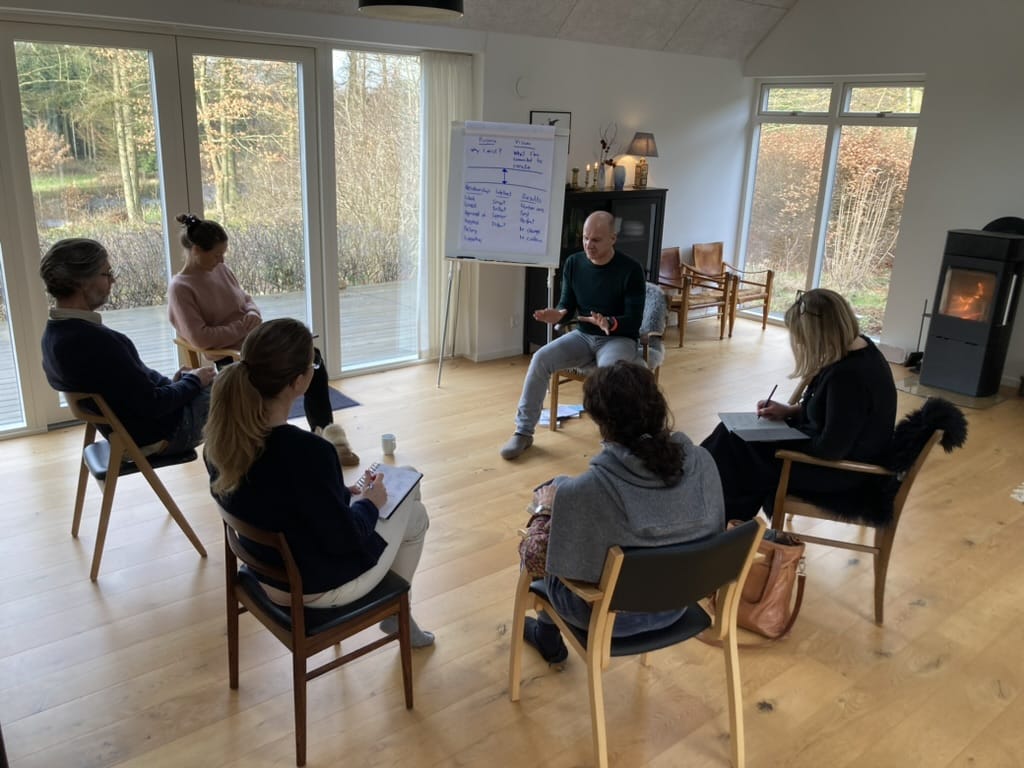Team Performance
- every day is a test in collaboration
There’s little better than being part of a team that truly works. Where you listen to each other – and not just hear what you expect to hear. Where you trust each other – without taking that trust for granted. Where, time and again, you demonstrate shared responsibility for your most important tasks and goals.
In a way, your team is being tested every single day. There is always something at stake when people work closely together. Every meeting, conversation, and task either makes you stronger, altså endnu mere direkte, tillidsfulde og åbne, eller svagerebecause something in the collaboration is faltering, causing you to become wary of one another and making it harder to communicate respectfully.
The perfect team doesn’t exist. However, there are well-tested paths that can take you a long way toward achieving it. The key lies in your ability to communicate and establish psychological safety. When you master this, you dare to be direct and open. You come to understand that conflicts, which inevitably arise in ambitious teams, are a necessary catalyst for strong team engagement.
You’ll be challenged when working with Leadership. How much are you willing to stretch yourselves to succeed? How ready are you to reveal who you each are, in order to strengthen the team? How courageous are you, and how far are you willing to go for one another?
You will often encounter our 3-4 favorite tools, models, and tests. First and foremost, we work with you, focusing on those present and what is happening in the room. Your experiences. Your core strengths. Your willingness to make the team perform. How do you succeed in sharing, speaking openly, and looking ahead?

Feedback Culture
Shortcut to Well-being and Clarity
- 1) Reflect on where you want to gain deeper insight about yourself in a specific work situation.
- 2) Ask a colleague to observe you. Be specific about what you would like them to pay attention to.
- 3) Explain that their role is simply to observe you without bias, like a detective at a crime scene or a witness in a courtroom – without interpreting or evaluating what they see and hear.
- Agree on when and where to meet so you can receive your feedback. The meeting should be brief, perhaps only 5 minutes. Prepare yourself mentally to ask follow-up questions until the feedback becomes specific enough for you to recognize yourself in the description. Once you’ve heard what your colleague has observed, you have a concrete, factual basis to either ask further questions or reflect on how you would like others to perceive you.
People give each other feedback all the time. We simply can’t help it. Unless we’re sitting with our eyes closed and fingers in our ears, we are constantly exchanging small messages with those around us. Why not take advantage of this flow of valuable communication that continuously runs through all organizations?
We need the recognition of others to confirm that we exist and have value. Having meaningful conversations with others helps us feel whole. When we are recognized and understood by others, we know we have a place on the team. It sharpens our sense of who we are and how we might benefit from contributing more of ourselves to the collective.
The opposite happens when others approach us with their judgments and interpretations, no matter how well-intentioned they are. We quickly become defensive or start thinking about how we can find faults in the person we’re talking to.
One of the most effective – and simultaneously educational and developmental – ways to build good relationships with colleagues is by asking them for feedback. Small wonders can happen when you start this practice. Within a few weeks, you can change the atmosphere in your workplace. You’ve begun creating a feedback culture.
All the energy you used to spend trying to figure out what others think of you can now be directed toward constructive conversations and creative processes, while you enjoy each other's company and help one another achieve strong results together.
Your concerns about whether you are good enough are replaced by a clarity of what others see and hear in your behavior – and how it affects them. This allows you to take effective, focused action if needed, or simply enjoy the fact that there was nothing to worry about.

The 5 Parameters
An Imperfect Recipe for Leadership Success
- Insistent trust
- Contagious responsibility
- Optimistic authority
- Disciplined presence
- Gifted courage
When people work closely together, busyness, pressure, and everyday misunderstandings can damage relationships with colleagues. When this happens too often, the team needs to be rebuilt.
Often, it’s the simple team virtues that are needed. First and foremost: How do you communicate with each other? Do you listen, or do you mostly wait to speak? Do you maintain an appreciative tone? How good are you at showing each other respect, and do you have a well-developed awareness of how you take responsibility? Do you set expectations and follow up? Are you aligned on what the team is here to achieve? How well do you know each other? Do you have genuine trust in one another?
All teams are unique. Therefore, team building is planned in close collaboration with you, the one who knows the team and understands what the team needs to develop.
We almost always use nature actively. In the undisturbed surroundings of Leadership Lighthouse's forest property on the Hærvejen or another suitable location. Wherever we are, we maintain focus on learning, efficiency, and the combination of fun and seriousness. You will experience doubt, resistance, and disagreements – as well as some paradoxes that need to be resolved with the team virtues you are simultaneously developing within the team.
Teambuilding
Shortcut to an effective everyday life

Would you like to learn more about how Leadership Lighthouse can help you or your organization?
Fill out the form below, and we will get back to you as soon as possible. We look forward to assisting you!


